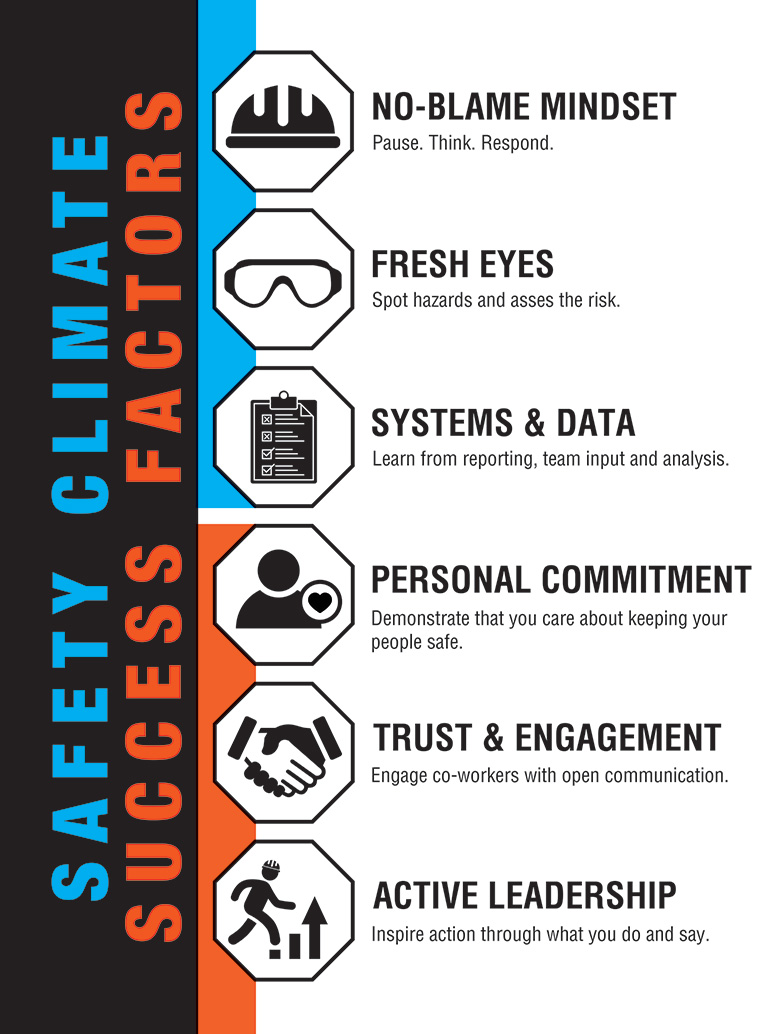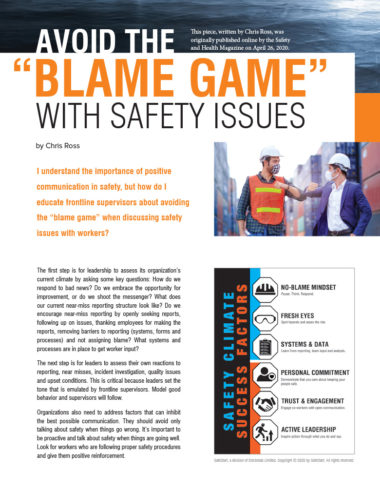This piece, written by Chris Ross, was originally published online by the Safety and Health Magazine on April 26, 2020.
I understand the importance of positive communication in safety, but how do I educate frontline supervisors about avoiding the “blame game” when discussing safety issues with workers?
The first step is for leadership to assess its organization’s current climate by asking some key questions: How do we respond to bad news? Do we embrace the opportunity for improvement, or do we shoot the messenger? What does our current near-miss reporting structure look like? Do we encourage near-miss reporting by openly seeking reports, following up on issues, thanking employees for making the reports, removing barriers to reporting (systems, forms and processes) and not assigning blame? What systems and processes are in place to get worker input?
The next step is for leaders to assess their own reactions to reporting, near misses, incident investigation, quality issues and upset conditions. This is critical because leaders set the tone that is emulated by frontline supervisors. Model good behavior and supervisors will follow.
Organizations also need to address factors that can inhibit the best possible communication. They should avoid only talking about safety when things go wrong. It’s important to be proactive and talk about safety when things are going well. Look for workers who are following proper safety procedures and give them positive reinforcement.

It’s also necessary to establish systems to capture and act on workers’ suggestions. When people submit near-miss reports or make suggestions that are ignored or not acted on, it makes it harder to get more suggestions and it stifles a climate of open communication. Develop robust collection and reporting systems, then educate supervisors on how to receive safety-related feedback and what to do with the information they collect.
The final piece of this is to provide supervisors with the necessary skills to enhance a climate of open communication. This includes encouraging the discussion of near misses. Any near misses that have serious injury and fatality potential need to be reviewed and investigated to learn important lessons that supply the organization with information that can inform local/departmental or broad organizational changes to prevent recurrence.
The thousands of non-SIF-related near misses, however, are also worth talking about because they’re free lessons. They don’t necessarily need to be formally reported, but potential similar incidents certainly can be avoided if these near misses are discussed. For this to happen, though, many supervisors will require some coaching on how to set a good example by effectively discussing their own near misses, as well as how to respond positively to near-miss reports, how to avoid blame and how to properly discuss safety issues with employees.

A substantial portion of frontline leaders will benefit from developing additional communication skills, such as active listening, asking open-ended questions and pausing to obtain responses, soliciting suggestions or recommendations from each team member, taking actions on suggestions, and having the courage to engage in difficult conversations. These are all skills that can be honed through practice, training and experience.
A supportive and structured environment can speed up the rate of learning and the adoption of new communication abilities. Creating a climate of positive and open communication requires constant attention to the little things. It’s imperative that everyone is on the same page, from the C-suite to the shop floor. Senior leaders demonstrate to supervisors the commitment to a climate of “no blame” by walking the talk, taking every advantage to catch people doing something right and offering positive feedback, while also supporting them in establishing stronger communication skills.
Chris Ross is a performance consultant, trainer, lecturer and presenter with over 35 years of experience, who specializes in helping organizations enhance and change their culture. He is an implementation specialist for SafeStart, a safety company focused on human factors solutions that reduce preventable death and injuries on and off the job.

Get the PDF version
You can download a printable PDF of the article using the button below.

